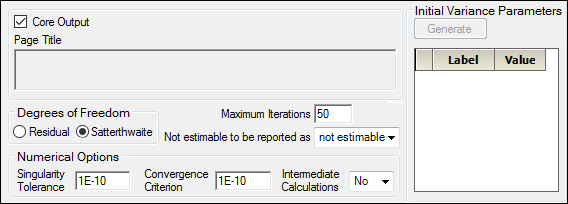The General Options tab is used to set output and calculation options for the model.

Check the Core Output box to include the Core Output text file in the results.
In the Page Title field, type a title for the Core Output text file.
Choose the degrees of freedom calculation method:
Residual: The same as the calculation method used in a purely fixed effects model
Satterthwaite: The default setting and computes the df base on c2 approximation to distribution of variance.
In the Maximum Iterations field, type the number of maximum iterations. This is the number of iterations in the Newton fitting algorithm. The default setting is 50.
Use the Not estimable to be reported as menu to determine how output that is not estimable is represented.
not estimable
0 (zero)
In the Singularity Tolerance field, type the tolerance level.
The columns in X and Z are eliminated if their norm is less than or equal to this number (default is1E–10).
In the Convergence Criterion field, type the criterion used to determine if the model has converged (default is 1E–10).
In the Intermediate Calculations menu, select whether or not to include the design matrix, reduced data matrix, asymptotic covariance matrix of variance parameters, Hessian, and final variance matrix in the Core Output text file.
In the Initial Variance Parameters group, click Generate to edit the initial variance parameters values.
Note: The Generate initial variance parameters option is available only if the model uses random effects.
Select a cell in the Value column and type a value for the parameter (default value is 1).
If the values are not specified, then Phoenix uses the method of moments estimates.
To delete one or more of the parameters from the table:
a. Highlight the row(s).
b. Select Edit >> Delete from the menubar or click X in the main toolbar.
c. Click Selected Row(s) and press OK.